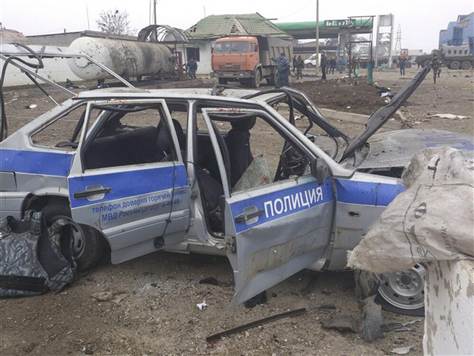
Experts Warn Moscow’s North Caucasus Policies Exacerbate Regional Instability
Publication: Eurasia Daily Monitor Volume: 10 Issue: 82
By:

Emil Pain, the well-known Russian expert on ethnic conflict and former Russian government official, has warned that the conflict in the North Caucasus is escalating. According to the Kavkazsky Uzel (Caucasian Knot) website, the number of casualties in the North Caucasus dropped to 199 in the first quarter of 2013 from 253 in the same period of the previous year. Pain, however, pointed out that the lower numbers of casualties was due to a change in tactics by the North Caucasus insurgency, which shifted its attacks from indiscriminate assaults to more targeted operations against government officials, police and official Muslim clergy. So, while the number of casualties plummeted, the number of attacks actually increased. According to Pain, the conflict in the North Caucasus is no longer just a religious or ethnic conflict, but spans different domains, including religion, ethnicity and territory (https://www.kavkaz-uzel.ru/articles/223312/).
If the changing statistics of the conflict in the North Caucasus indeed reflect a change in the tactics of the insurgency, then this also may point to an increase in the insurgency’s operational capabilities. Targeting select individuals among the authorities and police presumably requires substantially more preparation and support on the ground than carrying out indiscriminate attacks.
Commenting on the ongoing massive police and military special operation taking place in the Dagestani village of Gimry, Pain noted: “To imagine that it is possible to cleanse some sort of virus and resolve the issue through military means is an absolutely insane idea. This is not some sort of a finite resource that one can remove and clean out once and for all. New offended people will appear and relatives of those who were offended will also appear—the process will escalate. Moreover, the hostilities have escalated, since the war is not waged against narrow groups anymore. Today, the whole population is increasingly involved in the standoff” (https://www.kavkaz-uzel.ru/articles/223312/).
One of Russia’s best known experts on the North Caucasus, and a former member of Boris Yeltsin’s national security council, Pain also suggested that the conflict in the North Caucasus is gradually acquiring the distinct character of a colonial war against the general population of the region, specifically in Dagestan. As happens in a colonial war, the warring sides are increasingly divided into local militants and their supporters on the one side, and Russian and local forces ostensibly propped up by Moscow, on the other.
In Chechnya, on the contrary, Pain discerns a situation that resembles the 1991–1994 pre-war period, when Dzhokhar Dudaev came to power in the republic. Kadyrov’s forces are essentially not subordinated to the Russian federal government, so the regional forces may again block the Russian military garrisons in the republic, as happened under Dudaev. The increasingly personalized rule of Vladimir Putin is linked to the overall fragility of the situation in the North Caucasus. For example, few experts have predictions about how Kadyrov will behave after Putin, or what will happen in Chechnya after Kadyrov.
Ruslan Aushev, the former president of Ingushetia who remains a prominent figure in North Caucasian politics, unexpectedly spoke out against Moscow’s policies in the region. After Ingushetia’s parliament decided that it will appoint the region’s head in lieu of direct elections, Aushev apparently decided to express his political opinions extremely bluntly. Answering an innocent question about Moscow’s subsidies to the North Caucasus, Aushev lashed out at Russian critics of the region. Referring to the start of the Russian-Chechen war, he stated: “The Chechens said—‘give us independence, we do not need your money.’ The federal center said, ‘No, never.’ They went through [Chechnya] with fire and sword, returned [it] to [the Russian] legal space and said: ‘You will receive money, good subsidies’” (https://kavpolit.com/prezidentom-rossii-mozhet-stat-kavkazec-no-ne-sejchas).
Furthermore, Aushev openly stated that the head of Ingushetia should hold talks with the rebels, understand what they want and how to make peace with them. The former president of Ingushetia waved away Moscow’s disapproval of such contacts. “In Moscow, there are no militants and that is why they [Russian authorities] do not support [talks with them],” he said. “If militants scurried around somewhere in the Moscow region’s forests, the Kremlin would talk to them, I am certain of that” (https://kavpolit.com/prezidentom-rossii-mozhet-stat-kavkazec-no-ne-sejchas).
As instability in the North Caucasus persists, experts are increasingly coming to the realization that Moscow’s present policies in the region can hardly address the pressing issues of the area. Even though Russian authorities appeared to be satisfied with a containment strategy in the North Caucasus for limiting violence to the region, this approach does not seem to work. A territorial dispute between Chechnya and Ingushetia, a revolt by ethnic Russians in Stavropol region, and the expanding conflict in Dagestan and elsewhere in the region indicate that instability is not simply simmering at a certain level, but is proliferating and emerging in unexpected forms and in new territories. Given the current dynamics of the security situation unfolding in the North Caucasus, chances are slim that the Olympics in Sochi in 2014 will not be affected in some adverse way by regional developments and blowback from the ongoing insurgencies in the North Caucasus.




